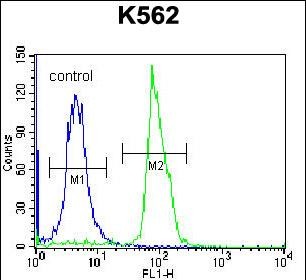

| WB | 1/1000 | Human,Mouse,Rat |
| IF | 咨询技术 | Human,Mouse,Rat |
| IHC | 咨询技术 | Human,Mouse,Rat |
| ICC | 技术咨询 | Human,Mouse,Rat |
| FCM | 1/10-1/50 | Human,Mouse,Rat |
| Elisa | 咨询技术 | Human,Mouse,Rat |
| Aliases | Semaphorin-4C, SEMA4C, KIAA1739, SEMAI |
| Entrez GeneID | 54910 |
| WB Predicted band size | 92.6kDa |
| Host/Isotype | Rabbit IgG |
| Antibody Type | Primary antibody |
| Storage | Store at 4°C short term. Aliquot and store at -20°C long term. Avoid freeze/thaw cycles. |
| Species Reactivity | Human, Mouse |
| Immunogen | This SEMA4C antibody is generated from rabbits immunized with a KLH conjugated synthetic peptide between 792-821 amino acids of human SEMA4C. |
| Formulation | Purified antibody in PBS with 0.05% sodium azide. |
+ +
以下是关于SEMA4C抗体的3篇参考文献概览:
---
1. **文献名称**: *SEMA4C mediates EMT and cisplatin resistance in breast cancer via the PI3K/Akt pathway*
**作者**: Li Y, et al.
**摘要**: 该研究通过SEMA4C抗体检测发现,SEMA4C在乳腺癌组织中高表达,并通过激活PI3K/Akt信号通路促进上皮-间质转化(EMT),导致肿瘤转移和顺铂耐药性。抑制SEMA4C可逆转这一效应。
2. **文献名称**: *Targeting SEMA4C in melanoma with a monoclonal antibody inhibits tumor growth and angiogenesis*
**作者**: Zhang H, et al.
**摘要**: 研究团队开发了一种靶向SEMA4C的单克隆抗体,发现其能显著抑制黑色素瘤细胞的增殖和血管生成,并通过阻断SEMA4C与受体Plexin B1的相互作用,抑制下游mTOR信号通路。
3. **文献名称**: *SEMA4C as a novel biomarker for prostate cancer progression and therapeutic target*
**作者**: Wang X, et al.
**摘要**: 通过免疫组化(使用SEMA4C抗体)和临床数据分析,该研究证实SEMA4C在前列腺癌中高表达且与不良预后相关。体外实验表明,抑制SEMA4C可降低肿瘤侵袭性和对放疗的抵抗。
---
以上文献聚焦于SEMA4C在肿瘤中的作用机制及抗体在基础研究或治疗中的应用,涵盖乳腺癌、黑色素瘤和前列腺癌等模型。如需具体文献来源或补充,可进一步提供DOI或PMID。
The SEMA4C (Semaphorin-4C) antibody is a tool used to study the SEMA4C protein, a member of the semaphorin family. Semaphorins are membrane-bound or secreted proteins involved in axon guidance, cell migration, and immune regulation. SEMA4C, a transmembrane protein, contains a conserved sema domain in its extracellular region and plays roles in neural development, angiogenesis, and tumor progression. It interacts with receptors like plexins and neuropilins to modulate intracellular signaling pathways, including MAPK and PI3K/AKT, influencing cell adhesion, proliferation, and apoptosis.
In cancer research, SEMA4C exhibits dual roles: it may act as a tumor suppressor by inhibiting metastasis in some contexts, while promoting tumor growth and angiogenesis in others. Dysregulation of SEMA4C has been linked to cancers (e.g., breast, prostate) and neurological disorders. The SEMA4C antibody enables detection and localization of SEMA4C in tissues or cell lines via techniques like Western blotting, immunohistochemistry, or flow cytometry. It aids in exploring SEMA4C's functional mechanisms, therapeutic potential, or biomarker utility. Challenges include clarifying its context-dependent roles and resolving cross-reactivity issues. Current studies focus on its interplay with tumor microenvironments and pathways, offering insights for targeted therapies.
×